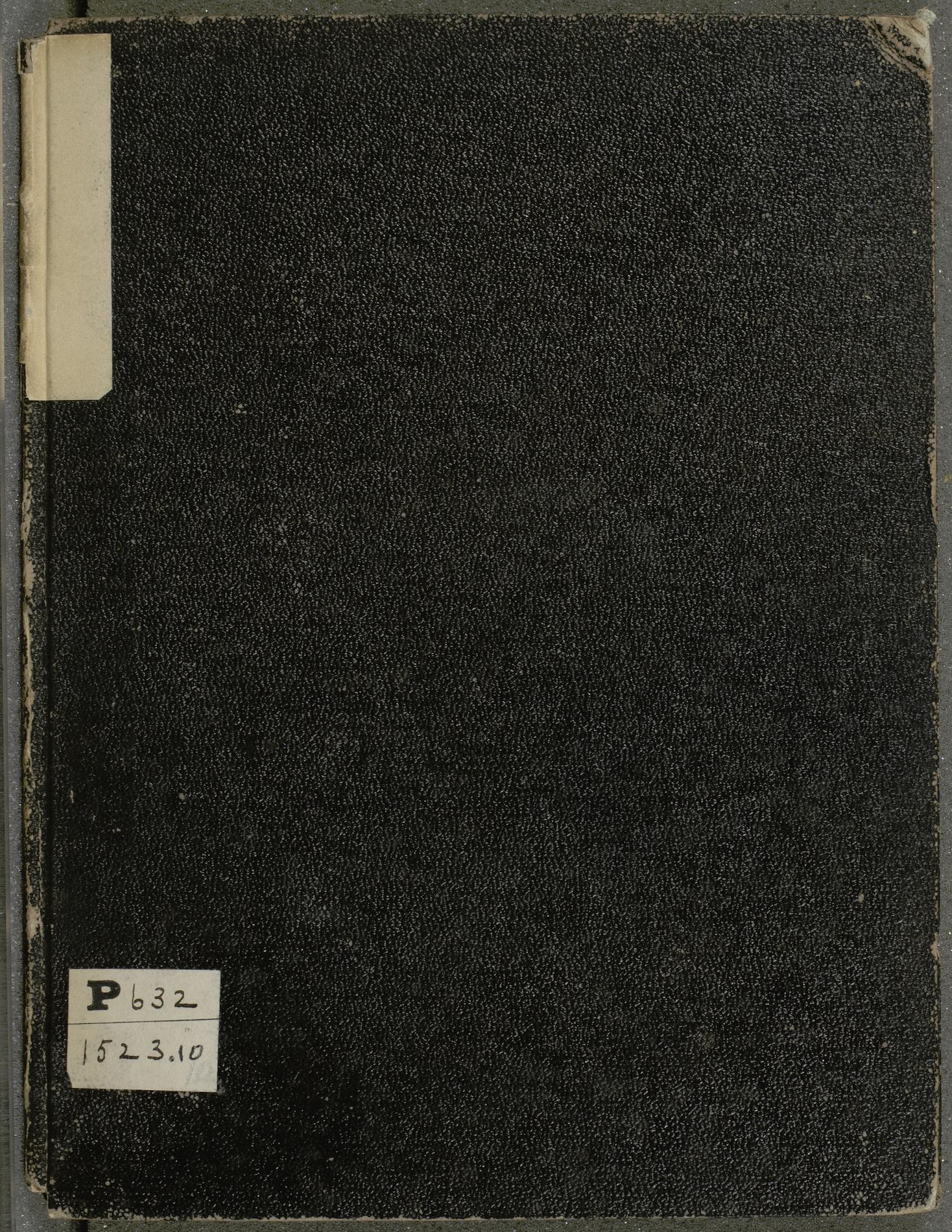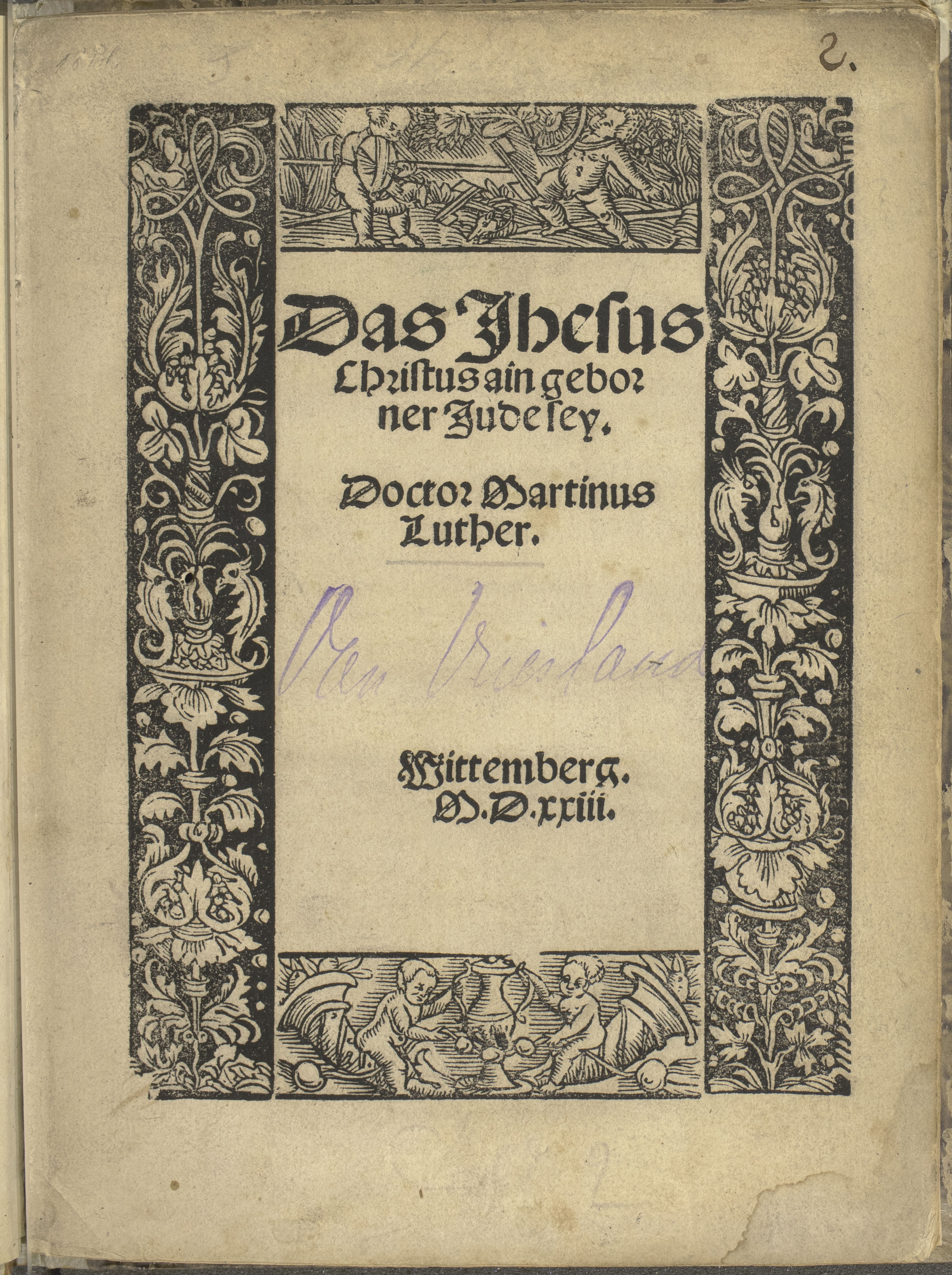Search
-
 Text
TextDas Jesus Christus ein geborner Jude sey
Luther, Martin, 1483-1546Summary: Luther was accused by Ferdinand (brother of Charles V) of teaching that Jesus was the seed of Abraham and that Mary was not a virgin either before or after the birth of Jesus. Luther replied with this booklet that demonstrated the human and divine natures of Jesus and showed sensitivity to Jesus' Jewish background. Luther hoped that books like this could be used to convert Jews from their erroneous beliefs. -
 Text
TextDas Ihesus Christus ain geborner Iude sey
Luther, Martin, 1483-1546Summary: The fifth printing of Luther's early treatise, "That Jesus Christ was born a Jew", in which he denies the charges made against him that he did not believe in the Virgin Birth, but rather that Jesus was a naturally born child of Joseph and Mary. In this tract, Luther confesses that he believes that Jesus was born a Jew of the Virgin Mary. He also hopes that his teaching will bring more Jews to convert to Christianity. -
 Text
TextEyn sermon Doctoris Martini Lutthers, durch jn auss gangen, auff das Ewangelion Matthei am V. Es sey dan[n] das ewer Gerechtigkait [etc].
Luther, Martin, 1483-1546Summary: A sermon by Martin Luther on Matthew 5,20 "unless your righteousness exceeds that of the scribes and Pharisees, you will never enter the kingdom of heaven." -
 Text
TextDas Ihesus Christus ain geborner Iude sey
Luther, Martin, 1483-1546Summary: The sixth printing (of ten in 1523) of Luther's early treatise, "That Jesus Christ was born a Jew", in which he denies the charges made against him that he did not believe in the Virgin Birth, but rather that Jesus was a naturally born child of Joseph and Mary. In this tract, Luther confesses that he believes that Jesus was born a Jew of the Virgin Mary. He also hopes that his teaching will bring more Jews to convert to Christianity. -
 Text
TextEyn Sendtbrieff vn[d] verantwortung etzlicher Artickel : an ein Christlilche gemain der Stat Essling
Luther, Martin, 1483-1546Summary: The Reformation in Esslingen was marked by a long series of conflicts and was not resolved until 1531. In this short letter Luther replies to the "Articles on Confession" proposed by J. Lonicer, pastor of Esslingen. -
 Text
TextEin Sermonn
Luther, Martin, 1483-1546Summary: This is Luther's first sermon for Christmas Day. It was first preached in 1520 and is a simple explanation of the biblical account of the birth of Christ. -
 Text
TextEin Sermon vom stand der Christ glaubigen Seelen von Abrahams schoss und Fegfeur der abgescheydnen Seelen
Karlstadt, Andreas Rudolff-Bodenstein von, 1486-1541Summary: In this sermon Karlstadt attacks the Catholic clergy for threatening people with fires of purgatory and eternal torment in order to persuade them to buy indulgences. The title vignette woodcut shoes people in purgatory. Priority of printing is unknown, because none of the printing originated in Wittenberg. -
 Text
TextKlag an künigkliche Maiestat Ungern vn[d] Behem wi[der] ainen Lutherischen münch prediger orde[n]s über viertzig artickel von jm geprediget, zuo Tetzschen in Behemer la[n]d Jm Jar 1522
Blochinger, MatthiasSummary: Dominicus Beyer was a Lutheran pastor in Tetschen, Bohemia in the early 1520's. From his preaching Matthias Blochinger drew a series of forty heretical articles. These he presents in this pamphlet together with the Catholic response. -
 Text
TextContra Henricum regem Angliae
Luther, Martin, 1483-1546Summary: This is the second and much expanded edition of Luther's reply to Henry VIII's Assertion of the Seven Sacraments. Luther replies quite moderately (for him) to what he feels to be the King's unwarranted assertions on the Catholic Sacraments. This is the second printing of this edition. -
 Text
TextVon Mensche[n] Leren zu[o] meiden
Luther, Martin, 1483-1546Summary: Luther addresses the monastic rules of fasting, obedience and celibacy, arguing that they have no foundation in scripture and that a transgression of these rules is therefore no sin. At the same time, Luther warns that a transgression of monastic rules in itself is by no means a sign of faith or internalized piety. -
 Text
TextLutheri, Melanch. Carolostadii &c. Propositiones, Wittembergae uiua uoce tractatae, in hocq[ue] pleraeq[ue] aeditae ab auctoribus, ut uel nos absentes cum ipsis agamus, uel certe ut ueritatis, et seductionum admonea[n]tur boni.
Luther, Martin, 1483-1546Summary: It was the practice at Wittenberg for the students to sharpen their logical and debating skills by responding to a set of theses proposed by the professor in the discipline in which they were working. These theses were often collected into book form for the use of the students and for the study of the topics by interested non-students. This group is from the early years of the Reformation, 1521-1522. Theses proposed in the Universität Wittenberg for the granting of doctoral degrees. In most cases the "respondents" are not indicated. -
 Text
TextAin Sermon vo[n] den Hayltumb[e]n vn[d] Geziert mit Überfluss, Vo[n] hailig[e]n Creütz jn den Kirchen
Luther, Martin, 1483-1546Summary: Sermon by Martin Luther criticizing the adoration of the cross and supposed relics of the Passion. -
 Text
TextUom Missbrauch der Messen
Luther, Martin, 1483-1546Summary: Written in Latin in the fall of 1521 under the title De abroganda missa privata, this is the third printing of the first German edition of Martin Luther's important tract on the celebration of private masses. Luther opposed any celebration of the Eucharist that was not accessible to or provided for the congregation at large and felt so strongly about this material that he translated it into German himself. -
 Text
TextAin Christlyche vnd vast Wolgegrünte beweysung von dem I[u]ngsten Tag : vnd von seinen zaiche[n] das er auch nit verr meer sein mag
Luther, Martin, 1483-1546Summary: First printing of an early Advent sermon by Luther, focusing on the signs of the impending end of the world. -
 Text
TextVon der Beycht, ob die der Bapst macht habe zuo gebieten
Luther, Martin, 1483-1546Summary: Second Basel printing of an early Luther treatise on Penance, together with a translation and exposition of Psalm 118. -
 Text
TextAin Sermon von den Hayltumben vnnd gezierd mit vberfluss, Vom hailigen Creutz in den kirchen
Luther, Martin, 1483-1546Summary: A sermon by Luther admonishing the directing of one's attentions not to the wealth of the church and its relics, but to the needs of the poor. -
 Text
TextAin Sermon Secundum Matheum. [sic] : Sagt von den Phariseyern Vn[d] wie er sey mit seym Bruoder versyenen soll, Kurtzlich Geprediget. In got versamlet. De insignibus D. Saxonie 1522
Luther, Martin, 1483-1546Summary: Sermon preached July 27, 1522, on Matthew 5:20ff. (Unless your righteousness is greater than that of the Pharisees, etc,.). -
 Text
TextPrima [-Sexta] pars biblie cu[m] glosa ordinaria : expositio[n]e Lyre litterali & morali: necno[n] additio[n]ibus ac replicis.
Summary: A Vulgate Latin Bible, with the "glossa ordinaria" of Walafridus Strabo and others, the "glossa interlinearis" of Anselmus Laudunensis, the "postillae" of Nicolaus de Lyra, the "expositiones prologorum" of Guillelmus Brito, the "additiones" of Paulus Burgensis, and the "replicae" of Matthias Doring. -
 Text
TextPontificale Romanum
Catholic ChurchSummary: The Pontificale Romanum contains the liturgical rites for the sacraments of confirmation and Holy orders performed by bishops. The work is called "liber pontificalis" (pontifical or papal book) here, as books bearing pontifical authority often were prior to the 16th century, but it should not be confused with the papal annals, also called Liber Pontificalis, which is used by historians of the early Roman Church

